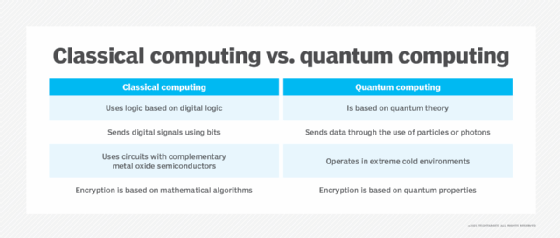Amazon Braket
What is Amazon Braket?
Amazon Braket is a fully managed Amazon Web Services (AWS) cloud service designed to provide quantum computer users with remote access to a single development environment. The service was announced in December of 2019 and is currently available in a preview mode.
Quantum computing focuses on making calculations based on the behavior of particles. Unlike classical computing, which uses bits that exist in a 1 or 0 state, quantum computing uses qubits, which can exist as a 1, 0 or in both states. This process is still new to many developers, and not many know if they should make use of it; if an organization should use it, then they may not know how.
Currently, Amazon is positioning Braket as a tool to help users familiarize themselves with quantum computing. Braket will provide users with a development environment in which they can begin to design, test and run quantum algorithms. Once a quantum algorithm is created, a developer can test it on a simulated quantum computer, then run the algorithm on their choice of quantum hardware.
Quantum computing is best suited for theoretical and computation-based computer science. Amazon has stated that Braket could be useful for scientists, researchers and developers; however, access to Braket is currently limited, mostly to Amazon corporate customers.

Amazon Braket uses
Because developers may not be experienced in creating algorithms for quantum computing, and access to quantum computers is currently limited, one of the overall uses for Amazon Braket is to get users familiar with developing in a quantum computing environment. Braket is also useful in normal quantum computing activities, including simulated systems that are used for discovering new drugs in the medical field, or in optimized systems, such as for supply chain logistics and machine learning.
How Amazon Braket works
Amazon Braket will let users design their own quantum algorithms; however, if they don't know how, then Braket has a set of prebuilt algorithms, tools and documents. Users can access the prebuilt algorithms and tools through Jupyter notebooks from the Braket console.
After users make their algorithm, Braket will allow them to test their algorithm and quantum circuits via a simulation service that will automatically set up the required compute instances. If something is wrong, then the user can troubleshoot and verify if the algorithm works.
Results from tests will be sent to Amazon S3 for users to analyze. In addition, event logs and performance metrics can be sent to Amazon CloudWatch.
From here, an algorithm can be run on a choice of quantum computing hardware, including gate-based superconductor computers, quantum annealing superconductor computers or ion trap computers.
Amazon Braket will also help manage classical compute resources to develop hybrid algorithms. Hybrid algorithms can be used to combine classical- and quantum-related tasks.
Amazon Braket features
Features of Amazon Braket include the ability to build a quantum-based algorithm from scratch or being able to choose a prebuilt algorithm. Braket is also based on Python code, making it easier for developers who already know the language. In addition, Braket helps manage classical compute resources, therefore establishing a low-latency connection to quantum hardware.
Amazon has paired with different organizations to provide a choice of quantum hardware for customers to run algorithms on. These include:
- Rigetti, which provides gate-based, superconducting qubit hardware;
- D-Wave, which provides quantum annealing, superconducting qubits; and
- IonQ,which provides gate-based, ion traps.
Amazon Braket vs. Azure Quantum
One month before Amazon announced Braket, Microsoft announced its own similar service. Azure Quantum is a Microsoft cloud service designed to provide users with remote access to quantum computers. Similar to Braket, the Azure Quantum service is available in a preview mode for those who want to get started in developing using an open source quantum development kit.
Azure Quantum is positioned similarly to Amazon Braket, where customers can use the service as an experience to learn how to develop in a quantum computing environment. Microsoft has also paired with quantum computing organizations to provide the hardware for users. Microsoft has paired with Honeywell, QLC and IonQ. Both Honeywell and IonQ use ion trap devices while QCI uses superconducting chips, similar to Rigetti.







